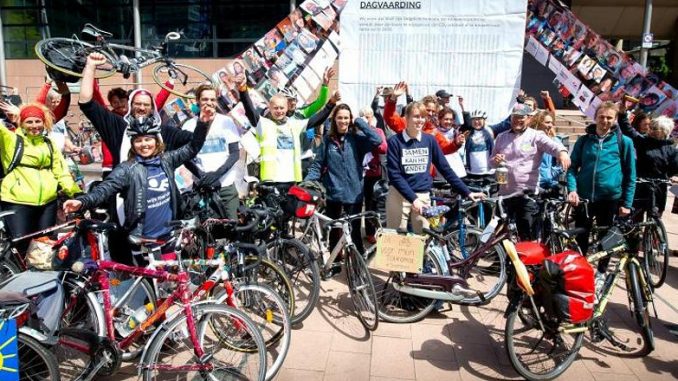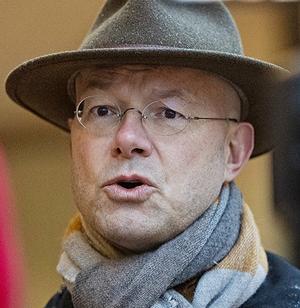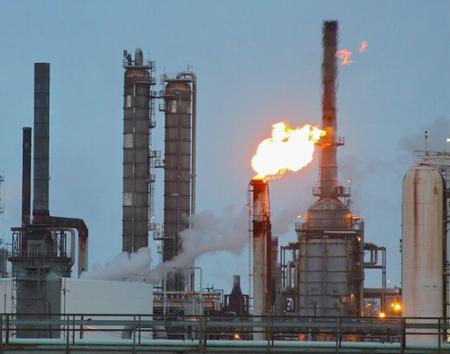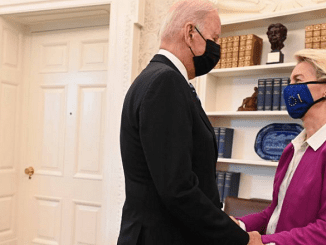
THE HAGUE, The Netherlands, May 26, 2021 (ENS) – For the first time in history, a judge has held a corporation liable for causing climate change. Today, as a result of legal action brought by Friends of the Earth Netherlands, Milieudefensie, together with 17,000 co-plaintiffs and six other organizations, the Hague District Court ruled that Royal Dutch Shell must reduce its carbon dioxide (CO2) emissions by 45 percent within 10 years.
Roger Cox, lawyer for Friends of the Earth Netherlands, is delighted with the ruling. “This is a turning point in history. This case is unique because it is the first time a judge has ordered a large polluting company to comply with the Paris Climate Agreement,” he said “This ruling may also have major consequences for other big polluters.”
This verdict will have enormous consequences for Shell and other big polluters globally, the plaintiffs predict. In addition to Friends of the Earth Netherlands, the co-plaintiffs are: Action Aid Netherlands, Both ENDS, Fossil Free Netherlands, Greenpeace Netherlands, Young Friends of The Earth Netherlands and the Wadden Sea Association and more than 17,000 Dutch citizens
Donald Pols, director of Friends of the Earth Netherlands, said, “This is a monumental victory for our planet, for our children and is a stop towards a liveable future for everyone. The judge has left no room for doubt. Shell is causing dangerous climate change and must stop its destructive behaviour now.”

The lawsuit was filed in 2018. Today, the court ruled that the Anglo-Dutch energy giant has a duty of care to reduce emissions and that Shell must comply with the judgment immediately, because the company’s current climate policy is not concrete enough.
The ruling will have major ramifications internationally, said Sara Shaw from Friends of the Earth International. “This is a landmark victory for climate justice. Our hope is that this verdict will trigger a wave of climate litigation against big polluters, to force them to stop extracting and burning fossil fuels. This result is a win for communities in the global South who face devastating climate impacts now.”
Main points from the verdict:
1 – Royal Dutch Shell must reduce its emissions by 45 percent net by the end of 2030.
2 – Shell is also responsible for emissions from customers and suppliers.
3 – There is a threat of human rights violations to the “right to life” and “undisturbed family life.”
Pols concludes, “This verdict is an enormous step forward for the international climate movement. One of the world’s biggest polluters has finally been held responsible. I am filled with hope for the future, as we know that the climate crisis does not wait and does not stop at our borders. That is why it is so important the judge is now forcing Shell to take responsibility for its actions. This is also a clear signal to the other big polluters that they also have to act now .”
Shell said in a statement that it expects to appeal the “disappointing court decision.” The company said it is already “investing billions of dollars in low-carbon energy, including electric vehicle charging, hydrogen, renewables and biofuels.”
“We want to grow demand for these products and scale up our new energy businesses even more quickly,” Shell said.
Shell says it has set “an ambition to be a net-zero emissions energy business by 2050, or sooner.”
The court said in an English language summary of the ruling that Shell is not currently in breach of its obligation to reduce emissions, as the environmental groups had argued, because the parent company was tightening its emissions policy.

But the verdict states that Shell’s policy “is not concrete, has many caveats and is based on monitoring social developments rather than the company’s own responsibility for achieving a CO2 reduction.”
“Therefore, the court has ordered RDS to reduce the emissions of the Shell group, its suppliers and its customers by net 45%, as compared to 2019 levels, by the end of 2030, through the corporate policy of the Shell group.”
Shell says it is already on track to net-zero emissions. In February the company released “Powering Progress,” a plan that sets out Shell’s strategy “to accelerate the transition of our business to net-zero emissions, in step with society.”
The “Powering Progress” document states, “Tackling climate change is an urgent challenge. We will contribute to a net-zero world, where society stops adding to the total amount of greenhouse gas emissions in the atmosphere.”
“That is why we have set a target to become a net-zero emissions energy business by 2050, in step with society and our customers,” Shell states in the document. “This supports the more ambitious goal to tackle climate change laid out in the UN Paris Agreement: to limit the rise in average global temperature to 1.5° Celsius.”
Headquartered in The Hague, Royal Dutch Shell operates in more than 70 countries with its 87,000 employees as of December 31, 2020.
Shell sold 69.67 million tonnes of liquefied natural gas (LNG) during 2020. The company has interests in 13 refineries around the world and produces 3.4 million barrels of oil equivalent per day.
Featured image: In front of The Hague District Court building, Friends of the Earth Netherlands supporters celebrate the verdict that orders Royal Dutch Shell to cut carbon emissions 45 percent by 2030. May 26, 2021 (Photo courtesy Friends of the Earth Netherlands)
© 2021, Environment News Service. All rights reserved. Content may be quoted only with proper attribution and a direct link to the original article. Full reproduction is prohibited.



